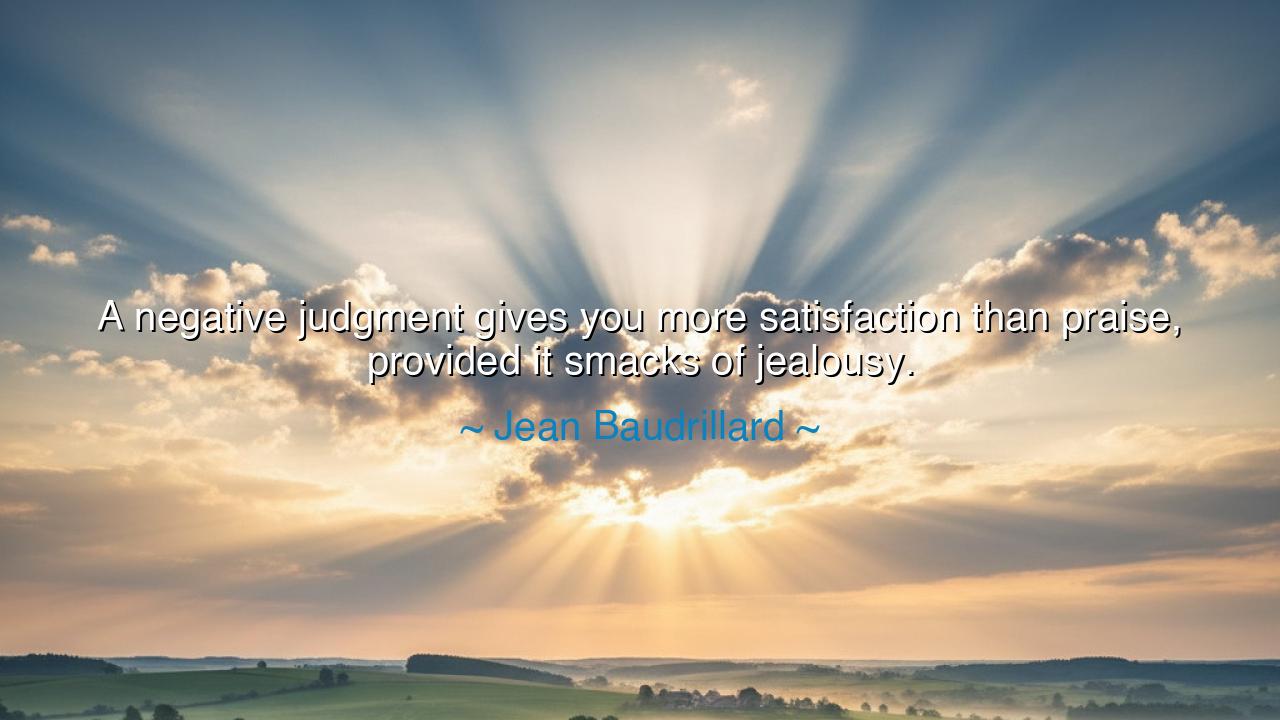
A negative judgment gives you more satisfaction than praise
A negative judgment gives you more satisfaction than praise, provided it smacks of jealousy.






Hearken, children of reflection, and attend to the words of Jean Baudrillard, whose insight peers into the shadowed chambers of the human heart: “A negative judgment gives you more satisfaction than praise, provided it smacks of jealousy.” Pause upon these words, for they reveal a truth both subtle and unsettling: the human spirit, when entangled with envy, finds a perverse pleasure not in honor, but in witnessing or imagining the struggle of others. The satisfaction arises not from recognition of merit, but from the bitter elixir of jealousy that colors judgment with shadow and desire.
Jealousy, in its most insidious form, transforms perception. Praise, though virtuous and affirming, is powerless to gratify the envious heart. Yet a negative judgment, particularly one tinged with envy toward another’s success, becomes a source of strange delight. This is the paradox Baudrillard illuminates: the pleasure derived is not noble, but profoundly human, born of the interplay between desire, rivalry, and the yearning to assert one’s significance in the world.
History and legend offer abundant mirrors of this truth. Recall the rivalry of Alexander the Great and his contemporaries, or the jealous critiques that attended the works of Michelangelo in the courts of Florence. Often, those who could not achieve greatness themselves sought satisfaction in deriding the accomplishments of others. Their judgments, though negative, carried the unmistakable mark of jealousy, and in that act, they felt a fleeting sense of triumph—an illusory victory over those whose talents surpassed their own.
Even in modern times, the phenomenon persists. In literary and artistic circles, figures like Lord Byron or Oscar Wilde were subject to harsh critiques that veiled envy as wisdom. Critics, who may have secretly coveted the audacity or brilliance of these creators, found in negative judgments a satisfaction more profound than ordinary praise, for it was the recognition of their own longing and limitation transmuted into censure. Baudrillard’s insight cuts sharply here: it is not the critique itself, but the presence of jealousy within it, that makes it intoxicating.
Yet this truth carries a warning. To take delight in the suffering or perceived inadequacy of others is to surrender the self to corrosive emotions. Jealousy may provide transient satisfaction, but it erodes the soul, blinds the mind, and diminishes virtue. Ancient sages taught that envy is a slow poison, one whose sweetness deceives and whose consequences are bitter. The pleasure of a jealous judgment is a shadow of power, never the substance of true excellence or honor.
From this reflection, practical wisdom emerges. Observe the stirrings of envy within yourself; recognize when delight in another’s misfortune or critique is colored by jealousy. Transform such impulses into self-awareness, admiration, and motivation. Let the success of others illuminate possibilities rather than provoke resentment. By cultivating humility and focusing on personal growth, one subverts the deceptive satisfaction that envy offers and nurtures a mind and heart capable of authentic joy and discernment.
Moreover, one must temper words with discernment. When offering judgment, ensure it is rooted in truth and constructive intent, not in the shadow of envy. Praise generously, critique honestly, and guard against the subtle seduction of taking pleasure in the shortcomings of others. In this way, one maintains virtue, clarity, and the capacity to grow without being ensnared by the corrosive fire of jealousy.
Therefore, generations to come, remember Baudrillard’s insight: the satisfaction derived from the negative judgments tinged with jealousy is fleeting, illusory, and perilous. Guard your heart against this temptation, cultivate admiration over envy, and let your words and deeds reflect integrity rather than the shadow of desire. In doing so, you preserve both virtue and peace, and transform the human tendency toward rivalry into the higher path of wisdom, generosity, and enduring fulfillment.
If you wish, I can also craft a more poetic, allegorical version of this reflection, portraying jealousy as a creeping shadow that momentarily illuminates false pleasure but ultimately consumes the soul, suitable for dramatic narration. Do you want me to do that?






AAdministratorAdministrator
Welcome, honored guests. Please leave a comment, we will respond soon